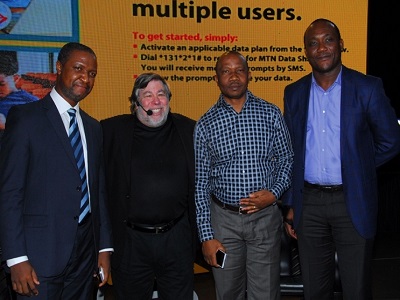News
Intel, ARM in Tug Of War Over Low-Cost Android Tablet Market

A tug of war has started between world’s largest chip maker Intel and ARM on who best will be patronised in the chip installation business for Android-based tablets, as Intel showed off with one of the first low-cost Android tablets with an Intel x86 processor at the Mobile World Congress, thereby putting ARM, whose processors go into most tablets today on the run.
As if that was not enough, Asustek released a 7-inch tablet running a single-core Intel Atom Z2420 processor code-named Lexington, which is targeted at low-cost smartphones and tablets.
Priced at $249, the tablet has 3G voice and data capabilities, and Asus claims it offers nine hours of battery life. The tablet includes multiple cameras and a 1280 x 800 pixel screen.
That tablet is comparable on price and features to low-cost 7-inch Android tablets with ARM processors. Hewlett-Packard recently introduced the Slate 7 with a dual-core ARM processor, which starts at $169 and offers 6 hours of battery life but does not have 3G capabilities.
Google’s Nexus 7 tablet starts at $199 with a quad-core ARM processor, but the price goes up with the addition of mobile broadband features.
Intel is just getting started in the low-cost Android tablet market. The company has so far offered the Atom Z2760 processor, code-named Clover Trail, only for Windows 8 tablets. Wanting to leave Clover Trail largely to Windows, Intel last year decided to develop Lexington, which is a variant of Intel’s Atom chip code-named Medfield.
Lexington chips are already found in low-cost smartphones like Kenya phone maker Safaricom’s Yolo, which is priced at about $125.
More Lexington-based smartphones are expected from companies like Lava International and Acer in developing countries.
Hermann Eul, the vice president and general manager of Intel’s Mobile Communications Group during an interview at MWC, in Barcelona said the low-cost Android device market is important for Intel, and more low-cost Lexington tablets and smartphones will be released going forward.
“The tablet market is important for us,” Eul said. “We will see all kinds of sizes.”
To gain an edge, Intel is also taking advantage of communications technology it acquired from Infineon, as exemplified by the Fonepad. There’s a big need for such devices, and Eul said that the company will focus on increasing its presence in the market by providing the chips required by device makers.
While Lexington for smartphones and tablets are viewed as for Android only, things will change toward the end of the year when Intel releases its latest tablet Atom chips, code-named Bay Trail, which are the successor to the Windows-only Clover Trail.
Eul said tablets with Bay Trail will be released simultaneously with Android and Windows.
That will effectively break up segmentations of Intel’s tablet chips based on OSes.
“Last year’s priority was Windows to catch the Windows 8 availability. Now we are pulling in all the Android tablets as well,” Eul said.
The Bay Trail chips will be based on an entirely new microarchitecture and are designed to be faster and more power efficient than their predecessors, according to Intel. The chip will be made on the 22-nanometer manufacturing process, and the 3D transistors will partly improve power and performance on the chips. Intel currently makes laptop and desktop chips code-named Ivy Bridge using the 22-nm process.
Eul could not say how Bay Trail tablets would be priced, and that device makers would define that. But the tablet markets develop very fast, and a year can change the scene, Eul said, adding that a range of form factors and OSes are redefining the space.
“How could we dare make a bet on what is going to be a winner two years from now? What is important is if you take the right steps, whatever pans out, we will still be in the game,” Eul said.
News
AfDB Supports Francophone Africa Start-ups with €6.5M

The African Development Bank Group last week approved an investment of €6.5 million in the Saviu II fund in order to support technology start-ups through their seed phase and first institutional fundraising, mainly in French-speaking Central and West Africa.

The Bank will invest €4.5 million as equity and €2 million as a first-loss hedging tranche on behalf of the European Commission, under the Boost Africa Programme.
This participation of the Bank Group will enable the Saviu II fund to give priority to companies with a strong technological or digital component.
Saviu II, the second investment vehicle of Saviu Partners, plans to invest between €500,000 and €3 million in about 20 technology or technology-oriented business-to-business start-ups in the seed phase or carrying out first institutional fundraising.
The Saviu II venture capital fund aims to make at least 60% of its commitments in the French-speaking countries of West and Central Africa: Côte d ‘Ivoire, Cameroon, Benin, Senegal, Togo, Burkina Faso and Mali.
The fund can also co-invest in promising technology companies in East Africa that have a strong team and business model, and whose strategy includes entering the market in French-speaking West African countries and establishing a strong presence there.
In addition, the fund will devote a dedicated envelope to pre-seed investments, focusing on minority equity investments, usually in co-investment with studios, incubators or other ecosystem partners.
News
Nigeria Inks $1.3bn MoU with AFC for Alumina Refinery, Mining Push

Nigerian Government has signed a $1.3 billion Memorandum of Understanding (MoU) with Africa Finance Corporation (AFC) via the Solid Minerals Development Fund (SMDF) to fund an alumina refinery, national geoscience mapping, and a strategic investment vehicle for mining growth.

Special Assistant to the Minister of Solid Minerals Development, Segun Tomori, said the refinery will process one million tonnes of bauxite yearly using a modern Bayer process, powered by an on-site gas-fired cogeneration plant.
Minister Dele Alake called it a transformative milestone boosting GDP, aligning with reforms that improve investment climate, regulations, and licensing to attract private capital. He directed agencies to fast-track permits.
The 20-year project at 95% utilization eyes 19 million tonnes total output, $1.2 billion annual GDP addition, $25 billion economic impact, and $8 billion forex earnings, per feasibility studies.
SMDF Executive Secretary Fatima Shinkafi termed it the agency’s biggest funding deal, supporting value-addition policy.
The partnership extends to geoscience mapping for mineral data, de-risking exploration, and a joint vehicle for mining assets.
Permanent Secretary Engr. Farouk Yabo praised the reforms. Shinkafi signed for government; AFC’s Franklin Edochie for the corporation, witnessed by AFC CEO Samaila Zubairu.
Tomori positioned it as Nigeria’s largest private mining investment and FDI magnet.
News
TeamApt, Awabah Partner to Boost Pension Drive for Nigerians

TeamApt Ltd., a subsidiary of Moniepoint Inc. and a leading financial infrastructure provider, has partnered with Awabah, the National Pension Commission’s first licensed Accredited Pension Agent, to expand pension access for millions of Nigerians in the informal economy.

The partnership was unveiled in Abuja at the launch of Awabah’s agent licence, themed “Building Financial Resilience: Securing the Future with Personal Pensions.”
At the event, PenCom Director-General Omolola Oloworaran underscored a major imbalance in Nigeria’s pension system, noting that while pension assets have grown to over ₦27 trillion, the benefits remain largely concentrated among formal-sector workers. She observed that most informal-sector workers—who make up the majority of Nigeria’s workforce—still retire without any form of savings.
This challenge is further highlighted in Moniepoint’s 2025 Informal Economy Report, which reveals that although 65 per cent of informal businesses recorded revenue growth, most lack the structural resilience required for long-term sustainability and succession.
Through the partnership, TeamApt—a Central Bank of Nigeria–licensed switching and processing company—will enable seamless pension registration and contributions for Awabah users via its Direct Debit service on Point of Sale (POS) terminals nationwide. Informal workers can enrol for personal pensions, tokenize their cards, and automate periodic contributions in just a few steps.
The initiative simplifies pension savings by turning what was once a complex, bureaucratic process into a routine transaction, enabling business owners and workers to build financial security beyond their productive years.
“When we started Awabah, we were driven by one core belief—that no African worker should be one accident or crisis away from poverty,” said Tunji Andrews, Chief Executive Officer of Awabah.
“This partnership with TeamApt allows us to scale that vision. By leveraging their Direct Debit service and extensive POS network, we are meeting informal workers where they already operate—markets, workshops, kiosks, and roadside businesses. With small, regular contributions, workers can now access personal pensions bundled with health, accident, and life insurance,” he added.
TeamApt CEO Dennis Ajalie said the collaboration aligns with the company’s long-standing mission to power Nigeria’s informal economy.
“At TeamApt and Moniepoint Inc., our focus has always been on enabling the informal sector,” Ajalie said. “Today, working within our licence framework and alongside our co-subsidiary, Moniepoint Microfinance Bank, we operate across all 774 local government areas, serving millions of Nigerians who drive economic activity.”
He described the partnership as a critical step toward pension inclusion, adding that it demonstrates how financial infrastructure can deliver real, long-term value to everyday Nigerians.
Ajalie also praised PenCom’s leadership for creating an enabling environment for innovation, noting that Oloworaran’s reforms have opened the door for partnerships capable of delivering sustainable pension coverage for informal workers.
The initiative is powered by TeamApt’s robust financial technology ecosystem, which has supported banks, fintechs, and financial institutions for more than a decade. Its omni-channel Direct Debit service allows automated recurring collections—such as pension contributions, subscriptions, and repayments—directly from customers’ bank accounts with their consent.
Beyond pensions, the platform enables informal workers to automate investments in the capital market, access healthcare through HMOs, and secure insurance coverage for themselves and their families—extending financial security far beyond retirement.

 E-Financial2 days ago
E-Financial2 days agoIran-Israel-US Conflict and CBN’s FX Gains: A Stress Test for Nigeria’s Monetary Stability

 E-Financial2 days ago
E-Financial2 days agoMutual Benefits Assurance Reaffirms Full Regulatory Compliance, Enhanced Governance

 General News2 days ago
General News2 days agoJAMB Uncovers AI-Driven Fraud Targeting UTME Candidates, Warns Parents

 General News2 days ago
General News2 days agoSERAP Asks FCCPC to Investigate Google, Meta, Others over Alleged Rights Abuses

 News2 days ago
News2 days agoTeamApt, Awabah Partner to Boost Pension Drive for Nigerians

 News2 days ago
News2 days agoFlashChange CEO, Bidemi Oke, Urges Startups to Build Strong Governance Structures Early

 General News2 days ago
General News2 days agoCapelli Institute Commits to Advancing Trichology in Nigeria

 E-Financial2 days ago
E-Financial2 days agoReps Mull Commission to Regulate Fintech Operations



























